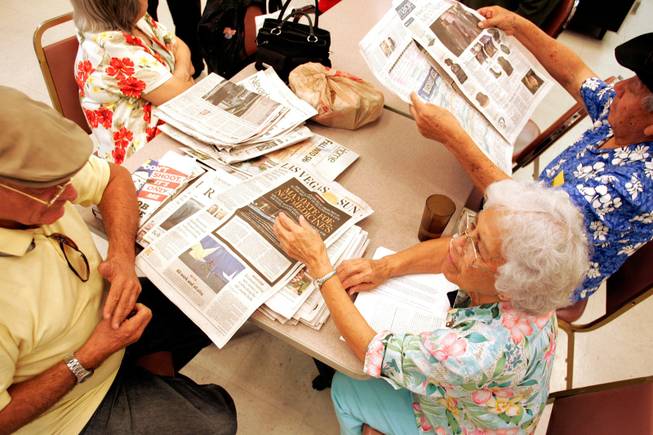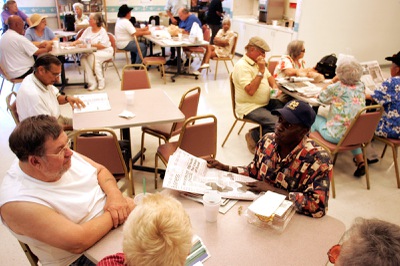
Talk among Don Shreffner, from left, Cippy Valle and her husband, Aurelio Valle, at the Henderson Senior Center on Thursday focuses on the economy. “I learned at an early age to save and prepare myself,” said Aurelio Valle. “And I have.”
Friday, Sept. 26, 2008 | 2 a.m.
Reader poll
Audio Clip
- Don Schreffner, 67, talks about the need to go back to work after retirement.
-
Audio Clip
- Don Schreffner, 67, talks about the government bailout.
-
Audio Clip
- Sally Matson, 76, talks about the current economic situation.
-
Audio Clip
- Sally Matson, 76, talks about the market turmoil and a taxpayer bailout.
-
Some of those to be hardest hit by the flood of bad economic news cascading down from Wall Street are retired Las Vegas Valley residents who, even a month ago, might have believed their days of work were behind them.
Now many of them are sitting, waiting and watching as reports of bailouts, buyouts and failings threaten their life savings.
And their plans? They are as varied as the people of the Las Vegas area.
Some are going back to work.
Everyone’s watching his spending.
And some aren’t doing much worrying at all.
“Sure, I’m scared for my investments,” says Don Shreffner, 67, a retired truck driver visiting the Henderson Senior Center on Wednesday afternoon. “All of us have pulled out of the market. We’re all watching it and wondering what’s happened.”
Fixed pensions used to be the gold standard for company retirees, but many employers have switched to 401(k) accounts, whose payments vary with investment results, in recent decades.
That shift has left people such as Larry Dostal, 70, and his wife, Sharon, 63, guessing how Wall Street’s tumult will affect their nearly $300,000 in retirement investments. Some of that money is in a 401(k), but most is invested with American International Group, the insurer that became the beneficiary of an $85 billion government bailout.
“Right now, as a whole, it’s still OK, but I’m sure we will feel it later,” says Dostal, a retired financial manager who worked 35 years for the same company. He now works about 12 hours a week at Henderson’s Multigenerational Center. His wife, a nurse, had planned on retiring in a few years.
“But now we’re not so sure she’ll be able to,” Dostal says.
Perhaps with good reason. People who were counting on their investments to see them through retirement are in trouble.
“And it is likely that older Americans are among the most at risk, especially those who got aggressive with their investment portfolios,” Jeremy Aguero, principal analyst with Applied Analysis, a finance and economics consulting company, says.
The risk is exacerbated because people are living longer — and are counting on the fruits of their investments to sustain them longer than earlier generations.
“This is the first generation that truly faces a crisis, versus those in the past who didn’t live long beyond their retirements,” says Hugh Anderson, vice president of ABD&F Group at Merrill Lynch and Las Vegas Chamber of Commerce government affairs chairman.
“The reality is that individuals, especially those who are already retired, recognize that there’s no additional income streams coming in while the purchasing ability of their dollar seems to shrink,” Anderson says.
Anderson generally recommends that those with investment plans reexamine them, and those without plans “develop one to best minimize volatility.”
The key, he adds, “is to avoid getting caught up in the daily noise and recognize that the world is not going to come to an end.
“I remind myself, and my clients, that I look out my window and cars are driving by and local businesses have cars in their lots. Things are muted, but they are not zero.”
That’s about how Gary Herndon, 58, who retired from the life insurance business three years ago, sees it.
“If you look back over the last 70 years, you see these things happen and it takes the stock market about three to five years to recover,” he says, adding that he “doesn’t even look” at his 401(k) because he’s confident of the eventual turnaround.
Still, he and his wife are finding it difficult to make ends meet.
They still go out for dinner, “but we don’t go here anymore, we go here,” Herndon says, shifting his hands from one side to the other.
Even so, after they pay the $1,100 a month mortgage, other expenses are forcing them to dip into their savings.
So he’s developing a marketing strategy for a business he wants to launch — he won’t elaborate except to say it could benefit from the problems people face in a tight economy.
“We need the extra money,” he says.
Richard Carlson is rocking back and forth on his heels in a shopping mall on Green Valley Parkway, thinking about simpler times, when people “didn’t kick you when you were down.”
The lifelong Las Vegas area resident wonders how his $3,500 monthly Teamsters pension — earned over 30 years working as a bellhop, doorman and gardener — Social Security benefits and tiny Naval Reserve pension are going to hold out.
His monthly payments include $1,200 on a mortgage, $400 on a truck, and a big chunk of money to help his 94-year-old mother, whose own savings are being drained by the assisted-living home she lives in.
“I’ll tell you, I won’t be buying another new truck again; I’ll run this one into the ground,” he says. “I’m not traveling like I would. At the end of the month, I pretty much have nothing left.”
His question is whether a Great Depression, if that’s what all this turns into, will hurt or possibly help the country.
“I’ve cut way back, but that’s not so bad,” he says. “I just wonder if maybe what happens will wake us up.”
Robert Southerland, 73, says he’s known for years where the nation’s economy was headed.
That’s why he doesn’t use retirement fund managers to handle his money. He does it all himself.
“I invest in commodities, things that are real,” says Southerland, a part-time actor whose day job is selling for a window manufacturer.
His investment philosophy, he says, has saved him from some of the worry weighing on other retirees.
“I’m not sitting pretty,” he adds. “But I saw this coming ... And you can’t take it too seriously. Stuff cycles back and forth. The price is always right, the only thing we don’t know is, when that price is coming around.”
Alex Richards contributed to this story.


Join the Discussion:
Check this out for a full explanation of our conversion to the LiveFyre commenting system and instructions on how to sign up for an account.
Full comments policy